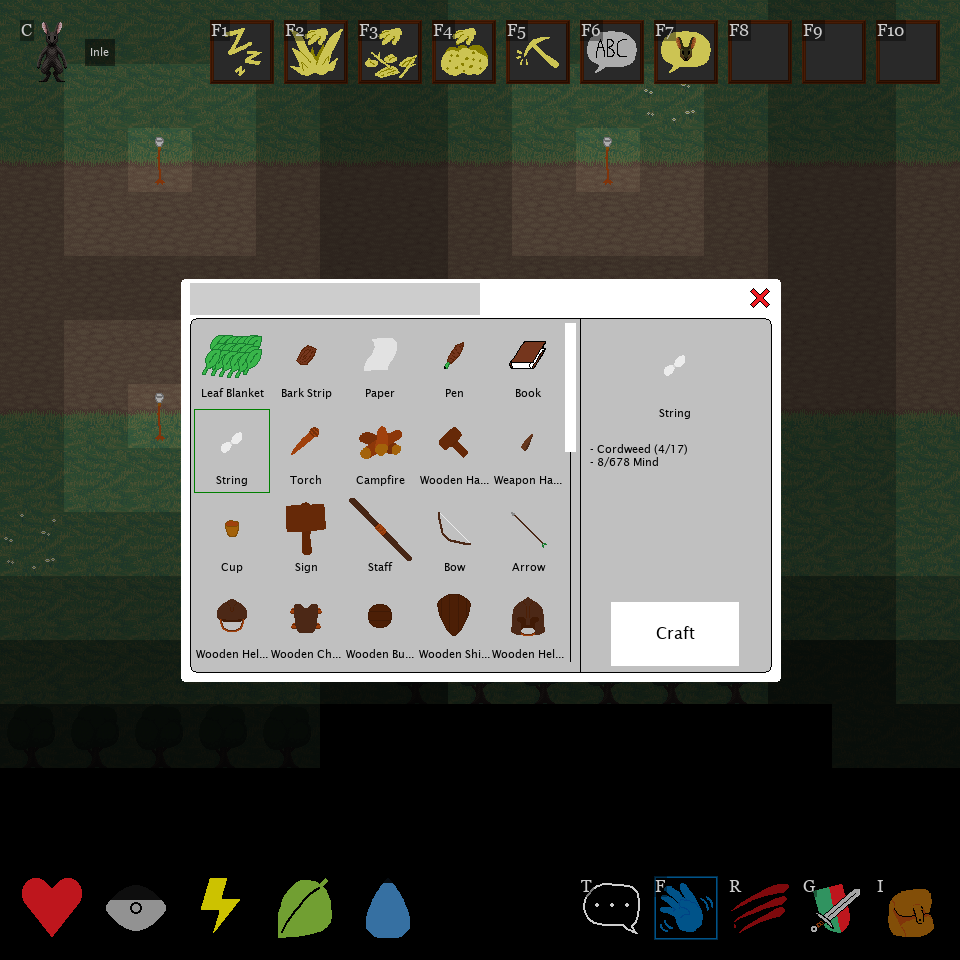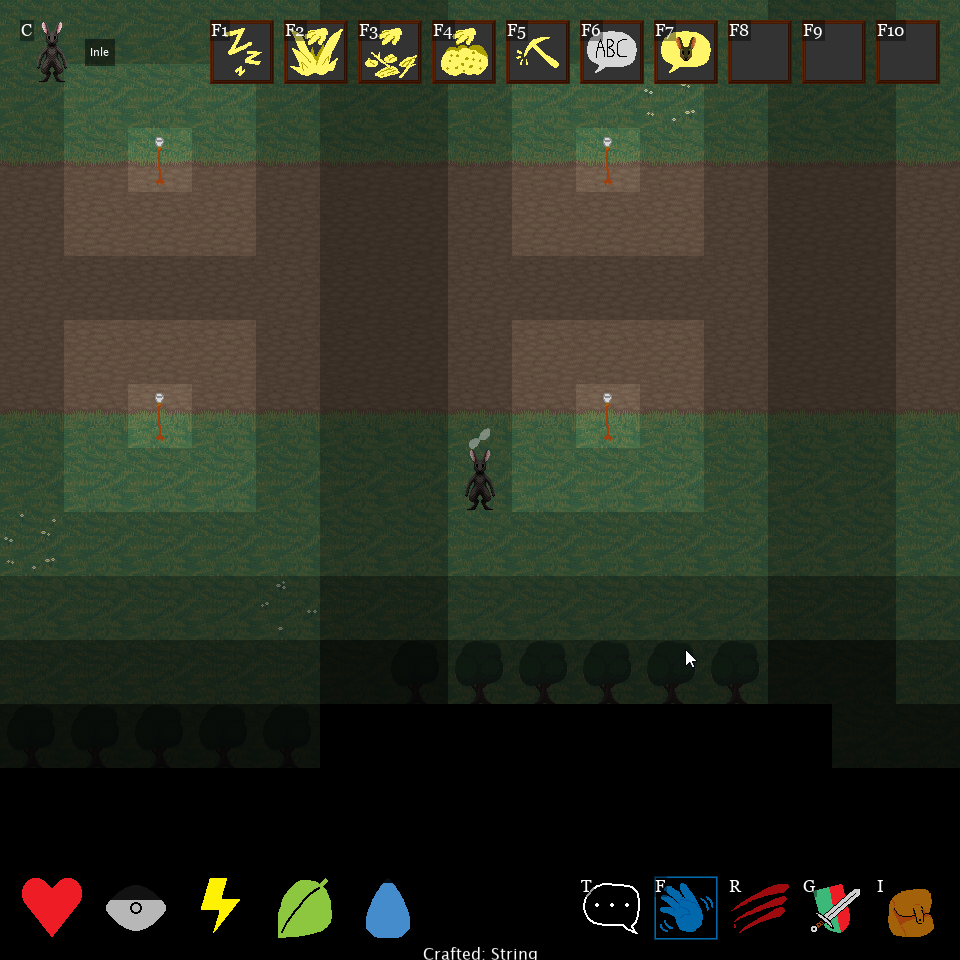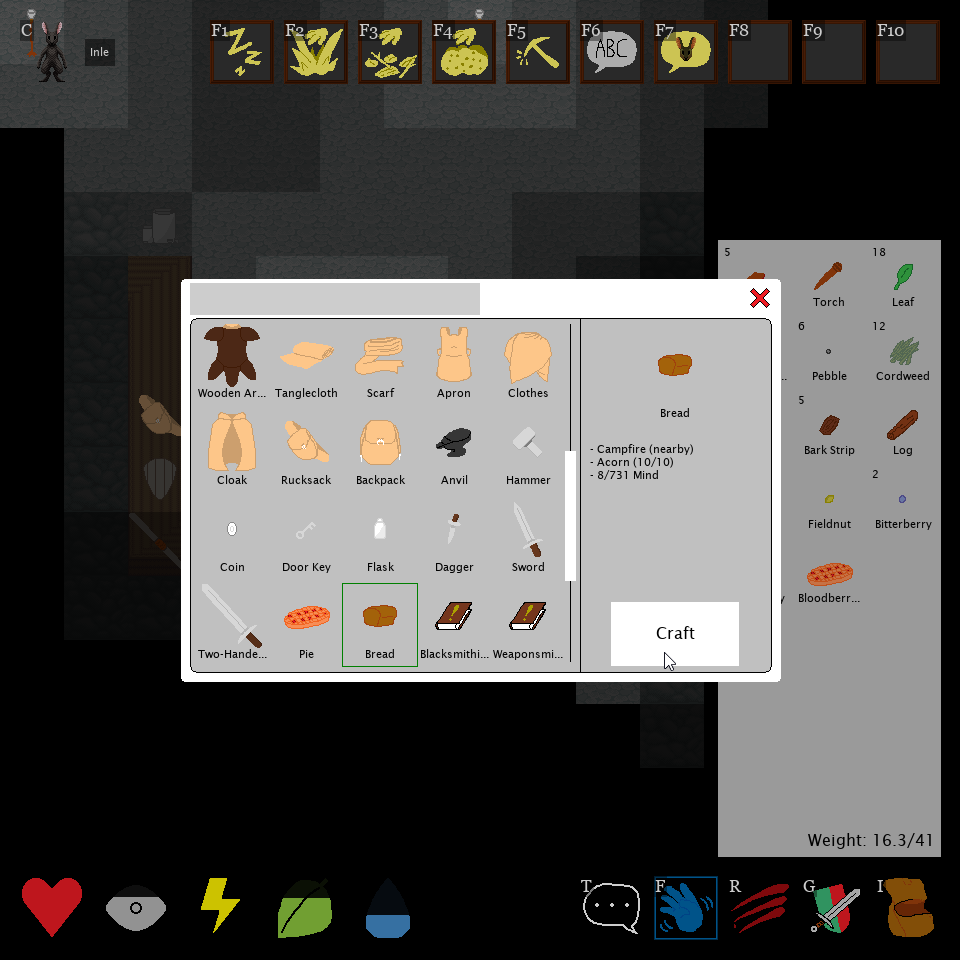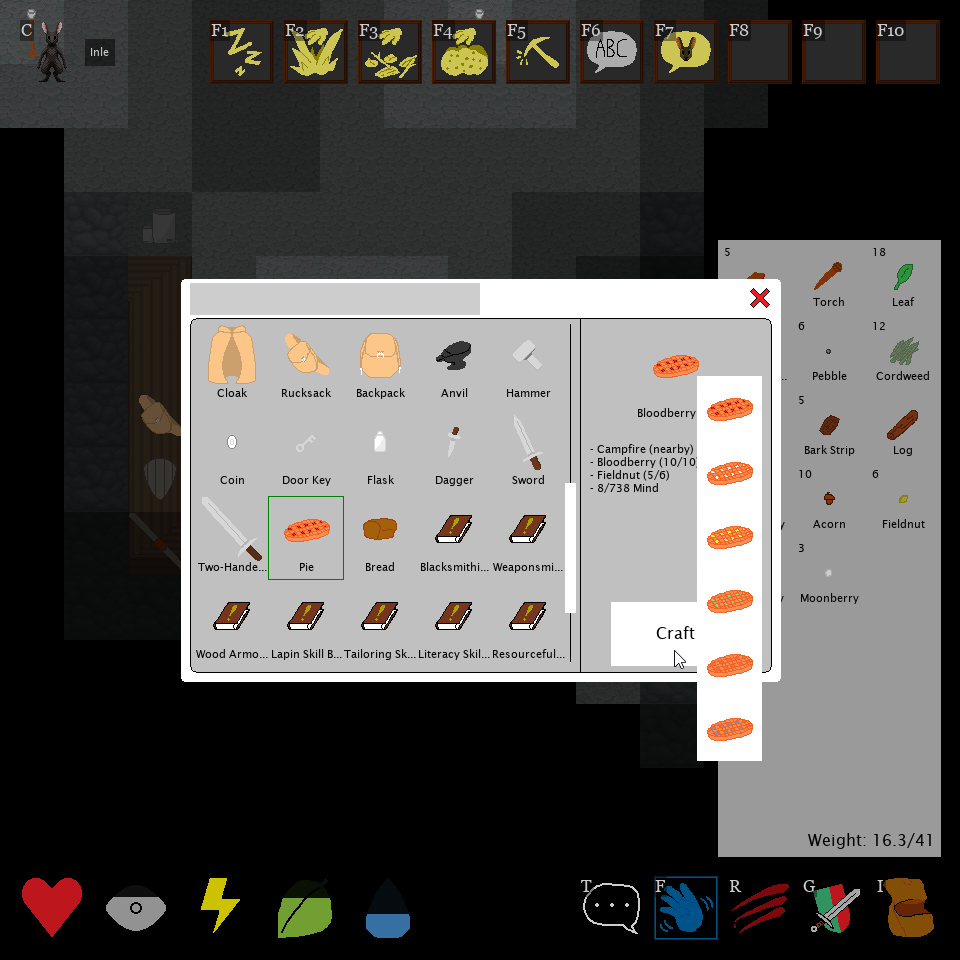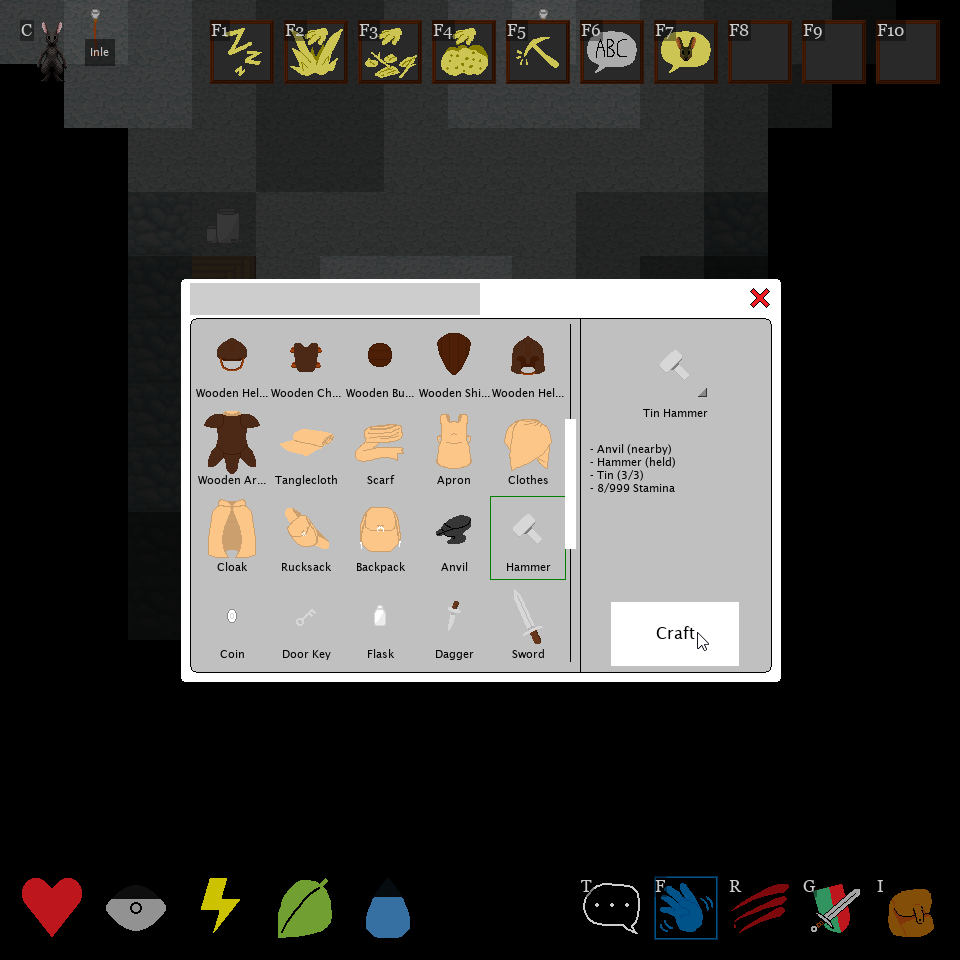

Server
Crafting
So you want to make a crafting character, huh? If scroungers are the foundation of the economy, crafters are... well, the ones who build the rest of the house. You can subsist indefinitely as a scrounger, but in order to make your life actually easier and better, you are going to depend on a crafter. Thus, the skills of a crafter are in hot demand by pretty much everyone, even characters that are otherwise self-sufficient. It's a great niche to fill! This guide assumes that you have read the guides on controls and user interface, so read the relevant portions of those guides if you have not already.
There are several types of crafter, which use either Strength, Intelligence, or Craft as their core stat. You will most likely want to build for one stat, and not several or all of them, because your crafting stat will impact how often you are successful at crafting an item as well as the quality of that item (if it has one), so you want it to be as high as possible.
- Forest Crafter (Craft): The most basic type of crafting, these crafters mostly turn raw materials gathered by scroungers into basic, everyday items or processed materials used by other crafters. Campfires can only be made with Forest Craft, which are required for cooking and brewing, and these crafters can turn cordweed into string, and tangleblossoms into tanglecloth, both vital resources for many recipes. They can also craft leaf blankets, allowing characters to rest anywhere on the map and quickly regenerate their resource pools. These are highly valued by pretty much anyone who doesn't already have one!
- Woodworker (Craft): Mostly using logs as material input, woodworkers can craft all sorts of furniture for decorating burrows, as well as several items that smiths require, such as handles to make weapons with, and wooden hammers for newbie smiths to be able to craft at all. Woodworking is also a requirement to learn Wood Armory, so most armorers will be proficient at both. However, since Wood Armory creates items with quality, armorers will want their Wood Armory skill to be as high as possible. Additionally, nothing produced by Woodworking is used in Wood Armory, so whether you invest beyond the requisite 10 levels is up to you.
- Wood Armory (Craft): These more primitive armorers are able to build non-resource-intensive wooden weapons and armor out of logs, bark, and tree sap. They are able to make more consistently high-quality items than smiths because they don't have any crafting tools they need to improve, and all their resources come directly from scroungers and forest crafters, reducing the middlemen they need to interact with. They are also the only characters who can make bows, arrows, and staves.
- Tailoring (Craft): Tailorers make their items out of tanglecloth and string, both procured from forest crafters. They can make cosmetic clothing as well as backpacks, which are the only means of improving carrying capacity, and therefore in high demand. The clothes they make are also important for weather protection in cold areas, without which critters will move at a speed penalty.
- Blacksmithing (Strength): Blacksmiths primarily produce common, everyday items like flasks, which are useful to everyone. However, they are also the only crafters that can produce hammers and anvils, the tools for all smithing skills. As a result, 10 levels of Blacksmithing are required to learn either Weaponsmithing or Armorsmithing; whether you want to invest beyond that or rely on dedicated blacksmiths is up to you. Hammers can also be used as weapons, making blacksmithing technically a weapon crafting skill.
- Weaponsmithing (Strength): Weaponsmiths can make daggers and swords, the primary weapons of combat characters in the game both Prowess and Strength-based as they typically do more damage than their alternatives. You will need metal and weapon handles for all of your recipes. These on their own aren't very many crafting recipes, and you have a lot of skill points, so smiths will typically pick up another smithing skill in addition to Weaponsmithing.
- Armorsmithing (Strength): Armorsmiths can make various types of armor covering the head and torso, as well as shields, out of metal and bark, which is used to provide sturdier straps than string or sap glue. Heavier armor will also require tanglecloth to pad the insides. Most armorsmiths are also proficient at Blacksmithing and possibly Weaponsmithing, but since Weaponsmithing and Armorsmithing both heavily depend on your skill level for the quality of items you produce, Blacksmithing is more advisable or you may be spreading your skill points thin.
- Cooking (Craft): Cooking is used to refine scrounged food into cooked meals, which restore significantly more hunger than the items they're made with, as well as allowing characters to go considerably longer without getting hungry. For this reason, cooks are every character's preferred source of food. And since food is something every character needs, almost all the time, their services are always in high demand.
- Jewelry (Craft): Jewelers combine the gems found randomly by miners with rings created by blacksmiths to allow the wearer to benefit from the magical effects of the gems. Different types of gems can provide improvements to stats and skills, and a green mage can enhance the potency of the gems to make them even better! Due to the resources involved, this is mostly an elite form of crafting with a small customer base, but since inexperienced green mages can shatter the gems while enhancing them, you'll always have repeat customers in the long term.
- Brewing (Intelligence): Like cooking, brewing can be used to refine scrounged food into various types of drinks which satisfy thirst better than water, and let characters go much longer without drinking. Unlike cooking, some of the items crafted with brewing can have secondary effects too! This makes up for the fact that water is a fairly plentiful resource, since brewed drinks can have positive benefits beyond just your thirst meter.
- Pestling (Intelligence): Pestling is an ingredient refinement skill, which turns herbs gathered by herbalists into more potent forms that can be inserted into food and drink to add special effects. While somewhat niche on its own, it can be useful when picked up with Medicine, which uses these herbs to apply the effects directly, or with Brewing, which is also an Intelligence crafting skill and allows you to spike your drinks with herbs.
- Gardening (Intelligence): A more passive form of crafting, gardeners can turn food gathered by scroungers into seeds, which they can plant in garden beds crafted by woodworkers. Over time, these seeds will blossom and provide more of the planted food. Gardeners can, over the long term, typically provide greater and more reliable quantities of food than scroungers for cooking and brewing. However, they are limited by the need for their garden beds to be outside in the sunlight, which means that they are always at risk of having their work stolen.
Building a Crafter
(top)To build an effective crafter, you will want to pick a crafting stat based on which of the skills above you want to use. This will be the core stat you build your character around; you will want to have at least 10 in your crafting stat, but the higher, the better. After the first 10 levels in a skill, you need 2 skill points to raise it further; raising the skill to 40 will require 100 skill points. Since you are given 180 skill points in your first nine intervals to complement your starting 20, this means that you can expect to pick up to two crafting skills to be good at, as skill points will start thinning out after that and you'll most likely find there are other skills you want to spend them on.
You may think that boosting your crafting stat as high as possible is always the best choice, but this isn't the case! There is a soft cap on how much your stat score affects the benefit you receive for each level in a skill. This cap starts at 10, and increases past 20 levels in a skill. You'll still receive a flat benefit for your high stat score in all skills which use the stat, but you will not receive the full benefit of the score until you've invested enough in the skill, whereupon each level will retroactively provide the full benefit. This primarily affects min-maxers, ensuring they can't invest in more skills than anyone else and will not be significantly more competent right off the bat, while characters with average scores are unaffected.
And there is a catch: while most crafting skills only require you to succeed in order to make an item, skills which produce weapons and armor will also assign a quality to that item based in part on how overwhelmingly you succeeded. This means that if you are picking up Wood Armory or any smithing skill, you don't want to put in just the bare minimum amount of skill points to successfully craft items. You will always want to raise these skills to 50 in the long term, no matter your stat score, to produce the best items you can.
The ramifications of this are that wood armorers will always want to dedicate themselves to their craft, investing only the minimum 10 in woodworking or possibly enough to achieve reliable success in it if they find they have skill points to spare. Technically, the hammers made by woodworkers also have a quality level, but it's rare for them to be used for combat, and smiths will graduate to metal hammers almost immediately, so it is rare for anyone to care about the quality of hammers you produce.
Smiths will likewise want to choose between either Weaponsmithing or Armorsmithing, no matter how high their Strength. They may also choose to dedicate themselves only to Blacksmithing, because hammers and anvils also have quality levels, and a dedicated blacksmith will produce better tools than all but the most wizened and experienced smiths who make their own tools. Since the tools factor into the quality of a smith's goods as well, weapon and armorsmiths will not want to settle for less.
Bear in mind that there are plenty of non-crafting skills your crafter will likely also want to pick up, and since these skills may not be based off your crafting stat, you will need to invest more skill points into them to be good at them. Thus, as always, it's best to specialize; trying to do every kind of crafting will leave your character struggling in other areas like exploration and self-defense. You can always make up for this by trading the goods you craft to get other people to do it for you, especially early on, but you'll likely find it helpful to not be completely useless at them.
Smiths use Stamina as their crafting resource, and all other crafters use Mind. The size of your crafting resource pool isn't necessarily important for a crafter, since it doesn't really matter how many crafting attempts you can make at once, but rather how many ingredients you have stockpiled for the recipe. Nonetheless, crafters benefit from the fact that their crafting stat will always contribute directly to their relevant resource pool, so you don't need to worry about improving it beyond that.
Basic Crafting
(top)Most crafting skills are extremely straightforward. Simply acquire the ingredients you need for a given recipe, either through scrounging, making them yourself, or trading with other characters, and open the crafting menu. Click on the recipe you want to craft, and if you have all of the ingredients and the necessary amount of either Mind (for Intelligence and Craft skills) or Stamina (for Strength skills), click on the Craft button. If you are successful, you will receive the item in your inventory; either way, the resources are expended.
Some skills require you to have a workstation, such as smithing, cooking, and brewing. Note that when viewing the recipe for a cooking item, the ingredients include Campfire (nearby). This means that you must have a lit campfire adjacent to you while attempting to craft, or the Craft button will remain disabled. Since campfires last only for a limited time, try not to leave them roaring when you are not using them. Make sure you put them out after you're done!
Other skills (the same ones, frequently) will have an option to craft different variants on a recipe with different ingredients. You can access these by clicking on the icon for the crafted item and selecting the variant you want to craft. For example, there are six different kinds of pies, one for each type of berry.
Smithing is arguably the most complex form of crafting. In order to smith, you will need not only the ingredients for a recipe, but also an anvil nearby and a hammer in one of your hands. A starter anvil can be found in the Morenth Library's common area, but you will want to replace it with one of your own as soon as possible, because it is the lowest possible quality. Likewise, since you cannot smith without a hammer, you also cannot smith a hammer for yourself. This would appear to be a conundrum, but woodworkers can provide you with a wooden hammer to get you started, with which you can smith your own hammer. Since a wooden hammer is, again, generally inferior to any metal hammer, you will want to do this as the first thing you smith.
In addition to those obstacles to beginning smithing, your skill level is not the only thing that will affect the quality of your work, as in Wood Armory. The quality of both the hammer you are using and the anvil will factor into your ability to succeed, and thereby also the quality of the finished good. Furthermore, the metal you are working with has a strong impact on the difficulty of the smithing, and you will need better-quality hammers and anvils in order to work more difficult metals at all. And you will want to work more difficult metals, because the metal used significantly affects how useful the finished product is, which also includes your own hammer! Therefore, you will want to upgrade your hammer not just in quality but also in material to get the best results.
Note that the rarity of a metal does not necessarily reflect its usefulness. Gold, for instance, is harder to find than iron, but iron will produce slightly more useful (albeit less flashy) equipment than gold.
Burrows
(top)All crafters will likely want to use their burrow certificate to open a permanent shop for their wares. You receive your burrow certificate on your tenth interval (your first being when you created the character), which represents somewhat less than a full day of active playtime; this can take anywhere from a week to three days depending on how long you play each day. Placing your burrow will give you a place which is (more or less) completely safe from other critters to store your things in. We say "more or less" because, while normally a locked burrow is completely impenetrable by anyone other than yourself, since you are using it as a shop you will want to leave it unlocked in order to entice people inside to trade with you.
So long as a burrow is unlocked, the items and people within it are not necessarily safe. Unlike the Morenth Library, characters can use hostile intent inside burrows if you grant them access, and you may not remove them once they have entered or lock the burrow until they leave. There are plenty of ways for inspired villains to rob you, so it is advisable to lock up your shop whenever you are not paying attention to it.
That said, burrows are extremely useful. You can store your ingredients there instead of carrying them around with you, which is particularly important for heavy tools like anvils and campfires. You may also decorate your burrow with any number of counters and doors for free, so you can dig out and set up a basic shop very quickly once you have placed yours, and keep whatever you don't want to display in side rooms where it's relatively safer.
If you decide you'd rather not take the risk, you can also keep your burrow locked and conduct all your trading in-person above ground. This will be a little less convenient for you, but also guarantees that anything you leave in your burrow is absolutely, completely safe from other characters so long as the burrow remains locked.
That's all for this guide. Feel free to return to the index and check out the others available to help you plan your characters!
